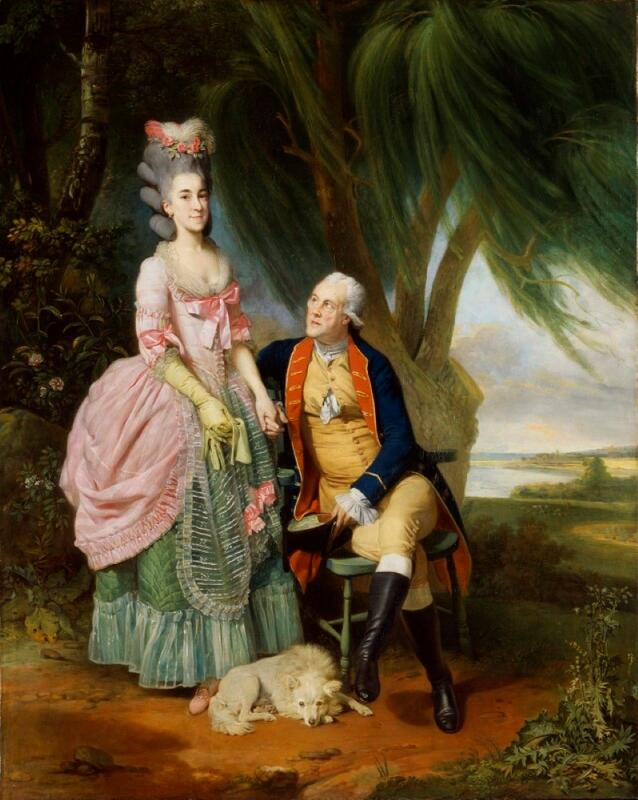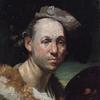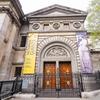More about Mary Wilkes; John Wilkes

Sr. Contributor
John Wilkes was a radical leftist who dabbled in Satanism, slut-shamed the Queen Mother, allegedly participated in orgies, was implicated in a pornography scandal, and once said he wanted to see the minarets of mosques rising in the neighborhoods of Christian cathedrals.
If you think that sounds like a 21st-century Brexiteer’s paranoid fever dream, think again. John Wilkes actually died more than two centuries ago. Nonetheless, he was practically tailor-made for today’s cable news or shock radio; a firebrand journalist, Member of Parliament, provocateur, and free speech activist who could deliver a burn that would make Twitter blush, and got “canceled” before cancel culture was a thing.
Though Wilkes was a proud hedonist and libertine who wore moral opprobrium as a badge of honor, the one constant in this rake’s progress was total devotion to his daughter Mary, at whom he gazes adoringly in this portrait. Fashion historian Aileen Ribeiro describes Mary’s candy-colored look as “fussily overdressed and lacking any innate sense of style,” which could be a symptom of Wilkes’ spoiling her. The fluffy white German spitz at Mary’s feet, however, is not a lap toy from her father, but Johann Zoffany’s own dog, Roma. The artist used Roma as a prop in several of his portraits.
18th-century horror writer and art historian Horace Walpole rather shadily called this painting, “A delightful piece of Wilkes looking - no, squinting tenderly at his daughter - it is a caricature of the Devil acknowledging Miss Sin.” He additionally expressed puzzlement at the presence of what he (probably erroneously) identified as a “palm tree.” Walpole further remarked that it was “horridly like,” an ironic jab at Wilkes’ famous ugliness. Such sardonic praise was typical of Walpole, a tough critic who, after all, even eviscerated an iconic Joshua Reynolds’ portrait he himself had commissioned of his own nieces.
Wilkes’ plethora of enemies likely agreed with Walpole’s comparison of him to the devil, though even they admired his devotion to his daughter. The same cannot be said of Wilkes’ relationship with her mother, a much older woman of large fortune whom he made no attempt to disguise was no more than a meal ticket to him. The couple grew quickly estranged, and Mary was his only legitimate child, though Wilkes sired several outside the marriage. She was so close to her father that she made the unconventional choice to live with him rather than her mother after her parents’ marriage disintegrated.
Relations with his wife were probably not helped by the fact that Wilkes spent less time in the marriage bed than with the Hellfire Club; a group of hard-partying gentleman occultists who congregated in gothic abbey ruins to get drunk, allegedly hold pagan orgies, and practice black masses and seances. Wilkes was reportedly fond of bringing a pet monkey dressed as a demon to these rituals to frighten other club members. On one such occasion, he made his most powerful and persistent enemy when he startled John Montagu, 4th Earl of Sandwich, at the pivotal moment of a seance. The humiliated Montagu was not one to forget a grudge, and this malicious prank would come to haunt Wilkes more than any ghost the Hellfire Club might have summoned.
Wilkes himself likely agreed with Horace Walpole’s dig at his looks. Wilkes was aware of his reputation for truly spectacular hideousness, and compensated by mastering the art of witty conversation. He wasn’t above a barb at his own appearance, joking that “it took him only half an hour to talk away his face,” and that he could best any rival in competition for a woman with just a month’s head start on account of his ugliness. Wilkes reserved the choicest burns for his enemies, however. He delivered his coup de grace against his old nemesis, John Montagu. When Montagu sniped that Wilkes would either die of the pox or on the gallows, Wilkes quipped, “That depends, my lord, whether I embrace your mistress or your principles.” While Wilkes dropped ye olde proverbial mic, Montagu failed to see the humor.
King George III was equally unamused by Wilkes’ antics. Things started to turn sour when Wilkes insinuated in his inflammatory newspaper, the North Britain, that the King’s close friend Lord Bute succeeded to a prime ministership because he was shagging the King’s mom. Things only got more acrimonious from there, as Wilkes relentlessly battered the King with criticism, and resisted any attempt to suppress his speech. Things culminated in two duels between Wilkes and supporters of Bute and George III. The first ended with both men missing, and moving on to the pub to settle their differences over a good laugh and a bottle of wine. The second ended with Wilkes’ adversary putting a bullet in his belly - but it would take more than a bullet to silence John Wilkes.
A good old-fashioned sex scandal accomplished what a bullet could not. Years earlier, as a pair of mischievous youths, Wilkes and a friend had supposedly co-authored a pornographic poem ironically titled “An Essay on Woman,” an ode to the sexual exploits of the famous courtesan Fanny Murray which was described as “the dirtiest poem in the English language.” Montagu, always waiting in the wings for a chance to take Wilkes down, obtained a copy and read it aloud before the House of Lords, despite the fact that Montagu himself had been one of Fanny’s principal lovers and patrons. This stunt caused such a furor that one peer almost fainted on the House floor from the shock. To avoid trial for obscene and seditious libel, Wilkes fled into exile in Paris where his adored Mary was studying, but was convicted in absentia and later arrested upon his return to England.
Nevertheless, Wilkes, as ever, got the last laugh. Courtesans of the day like Fanny Murray and Kitty Fisher were celebrity fashion icons and Robin-Hood-esque street heroes, beloved by the common folk for rising from the gutter to the court on nothing but sex, guts and charm. Fanny had by then reformed and embarked on a happy and faithful marriage with a popular actor, so public sympathy for her ran high. It was not lost on the British people that Montagu sinned more in his hypocrisy by outing his own mistress, than did Fanny as an “honest whore.” Moreover, hypocrite was about the only rotten name one could not sling at the scrupulously unscrupulous Wilkes, and he walked away the better man in the court of public opinion.
The scandal was the nail in Wilkes’ political legitimacy, but only boosted his popularity with his anti-establishment constituents, who continued to reelect him in the face of multiple expulsions from Parliament, and rioted upon his arrest. He remained unshaken in his commitment to free speech, freedom of the press, and freedom of religion. He even went so far as to proclaim, “I wish to see rising in the neighborhood of a Christian cathedral, near its Gothic towers, the minaret of a Turkish mosque, a Chinese pagoda, and a Jewish synagogue,” a statement that would be just as controversial in right-wing circles today. His championing of civil liberties and tireless trolling of King Goerge III made him a rock star to the revolutionary American colonists, and he even inspired provisions in the U.S. Constitution.
That was not Wilkes’ only tie to the American colonies. His sister, Mary Hayley, was one Britain’s first female business tycoons, operating a lucrative shipping and whaling enterprise out of Boston, where the tea from the Boston Tea Party was on one of her ships. She shared her brother’s outrageousness as well as his magnificently ugly physique, so manly in appearance that she was once mistaken for John Hancock, but that didn’t stop Abigail Adams from admiring her gumption. Nor did it stop Hayley from marrying three times; increasing her fortune the first two, and frittering it away on a man 20 years her junior the third, before retiring to a life of high style in Bath.
Her niece, Mary Wilkes, inherited the family lack of good looks, but was not as prolific in the marriage department as her aisle-hopping aunt, living out her days as a fabulously wealthy spinster instead. Upon her death, Mary bequeathed this portrait to Hayley’s daughter, writing in her will, “'I give to my aforesaid cousin, lady Baker, the picture, by Zoffany, of my dear father and myself.” A fittingly familial tribute from a daughter to the rogue whose one sentimental impulse was to love her.
Sources
- Clements Library, University of Michigan. “John Wilkes Papers (1740-1791).” Accessed April 23, 2022. https://quod.lib.umich.edu/c/clementsead/umich-wcl-M-229wil?id=navbarbr….
- Druett, Joan Druett. She Captains: Heroines and Hellions of the Sea. New York: Simon & Schuster, 2001.
- “John Wilkes.” Encyclopedia Britannica. Accessed April 23, 2022. https://www.britannica.com/biography/John-Wilkes.
- McCullough, David. “John Wilkes and the Hellfire Club.” Newington Green Meeting House. Modified March 23, 2022. https://www.ngmh.org.uk/blog/john-wilkes-and-the-hellfire-club.
- Mellen, Roger P. "John Wilkes and the Constitutional Right to a Free Press in the United States." New Mexico State University. Accessed April 23, 2022. https://web.nmsu.edu/~rpmellen/Wilkes%20Article%20Mellen.pdf.
- Moniz, Amanda Bowie Moniz. “A Radical Shrew in America.” Commonplace: the journal of early American life. Accessed April 23, 2022. http://commonplace.online/article/a-radical-shrew-in-america/.
- National Portrait Gallery. “Mary Wilkes; John Wilkes.” Extended Entry. Accessed April 23, 2022. https://www.npg.org.uk/collections/search/portraitExtended/mw08275/Mary….
- National Portrait Gallery. “Mary Wilkes; John Wilkes.” Overview. Accessed April 23, 2022. https://www.npg.org.uk/collections/search/portrait/mw08275/Mary-Wilkes-….
- Rendell, Mike. “The delectable Fanny Murray – a courtesan who became the Toast of the Town.” English Historical Fiction Authors. Modified April 6, 2018. https://englishhistoryauthors.blogspot.com/2018/04/the-delectable-fanny….
- “Revisiting the ‘Essay on Woman’ Scandal.” The John Wilkes Club. Modified July 23, 2022. http://www.thejohnwilkesclub.com/2013/07/23/revisiting-the-essay-on-wom….
- Ribeiro, Aileen Ribeiro. The Gallery of Fashion. London: National Portrait Gallery Publications, 2000.
- Sainsbury, John. John Wilkes: The Lives of a Libertine. Aldershot: Ashgate Publishing Limited, 2006. https://books.google.com/books?id=VHZotKrfVq0C&pg=PA71&lpg=PA71&dq=john….
- Spartacus Educational. “John Wilkes.” Accessed April 23, 2022. https://www.britannica.com/biography/John-Wilkes.











